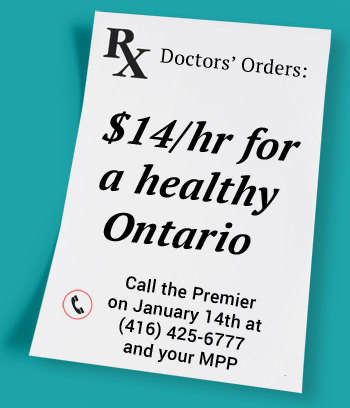Many health care professionals in Toronto are calling on their provincial government to raise the minimum wage by $3.75/hour to $14. They argue that poverty is not just a public health issue but “the biggest barrier to good health.” The group Health Providers Against Poverty is behind the movement and it seems that doctors orders may not be the right cure this time around.
Lorraine Telford, an employee of a Mississauga health center, said that a tenth of the province’s children face dire financial situations at home while an additional fourteen percent are “in deprived situations. Because their nutritional needs are not being met, she argues, it’s impossible for them to be expected to perform well in school. Hunger does, the evidence shows, have a detrimental impact on the performance of children in school. Obesity does as well, and some argue that a major cause of obesity is that parents don’t have the energy to cook dinner or the money to afford healthy food.
One of the doctors with the organization, Gary Bloch, pointed out that living conditions have a dramatic impact on people’s health. Before dealing with medication or other solutions, which many of his patients can’t afford, he works with them on issues related to their incomes and housing. He credits that focus to most of the improvements in the health of his lower income patients.
Another member of the group, Axelle Janczur, argues that the impact for families would be huge, providing the poorest Ontarians an extra $650/month before taxes. She says that the impact on businesses would be minimal since those on the lower rungs of the workforce would spend their money at home, thus putting the money back into local businesses.
The Retail Council of Canada and the Ontario Chamber of Commerce offered an alternative proposal. They argued that the dramatic change, even if phased in over a period of two years, as the proposal suggests, would have a devastating impact on businesses. Instead, they recommend tying the minimum wage to inflation. The dramatic increase would, they suggest, have more to do with good politics than sound policy.
In 2011, nearly half a million people in the province earned the minimum wage. A little over three in ten of them were under 25. Among those working for minimum wage were one in ten women and about one in thirteen men.
The province’s minimum wage falls in line with those in the rest of the country. All provinces are within the $9.95-$11 range. A panel set up by the government will study the question and make recommendations on the implementation of an increase.
While they have correctly identified the problem, their proposed cure is worse than the disease.
Businesses pay their employees based on the value that they bring to the company. When employees bring more value to a company than the minimum wage warrants, they earn more than the minimum wage. When they don’t, they either earn the minimum wage or are unemployed.
Low minimum wages – or, better yet, no minimum wages – offer unskilled workers the opportunity to learn skills and gain experience that can propel them into better positions. While they offer some value, they can also gain training and earn money for their efforts. They may not earn what they would like, but they do get the chance to work towards their financial goals.
Raising the minimum wage, especially as dramatically as the group is proposing, will force businesses to adapt or close. In most cases, they will raise prices. When they do this, they will inevitably lose some customers, and they will have to hope that the increased revenue from the new customers is sufficient to cover the losses from those who stop buying from them. Almost inevitably this will stop even the ones for whom this works out from expanding.
Other businesses will start laying people off. Firing people is never an easy thing to do, but for many it will end up being the only available option. Some fast food workers in the United States are learning that lesson the hard way as restaurants automate some of their service jobs. Some small business owners will have to take on more of the day-to-day operations than they currently do. This not only means that another employee with no skills finds himself out of a job, but it also means that the business owner doesn’t have time that he otherwise would to spend on expanding.
Finally, there will be businesses that simply close up shop, making the determination that the profit earned from their business after paying the increased wage(s), if there is any left at all, is insufficient to justify the risks and effort involved in keeping their businesses open. Not to mentions the decrease in competition from businesses closing up which which will most likely drive up prices from other businesses who did not close (basic supply and demand), thus adding greater inefficiency into our economy. This also means that unskilled workers lose their jobs, customers no longer have access to the business’s services, and the community could see money leave if the business owner has no other ties to the city.
Attempting to address poverty is a worthy goal, but those doing so have to keep in mind the potential consequences of their actions. In this case, advocates of the increase would be hurting exactly the people they want to help. This impact could prove devastating over the long term as it prevents young people from having access to the lowest rung on the career ladder. Even though these doctors mean well, they should stay out of economics and politics altogether.
Post your thoughts below.



